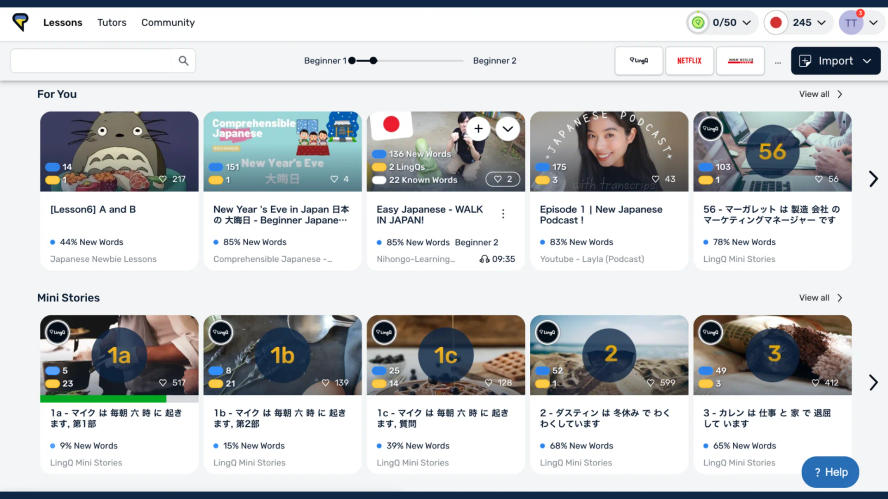TL;DR Summary
When you start a new language, it always feels out of reach at first. I’ve felt that every time. The best thing you can do is just listen and read, even when you don’t understand much. Bit by bit, the sounds and words begin to mean something. Don’t rush it or worry about structure too soon — that part will come naturally once you’ve spent enough time with the language.
Learning a language from scratch can be a daunting task. Where do you start? How do you develop a language learning routine that works for you? Here is what I would do if I had to learn a language as an absolute beginner.
My Approach to Learning a Language as a Complete Beginner
1) Find a Starter Book
Start out with a beginner-friendly resource. Let’s imagine that I decide to start a new language like Turkish or Arabic. I definitely intend on doing this in the future. My first step would be to buy a starter book. This could be Teach Yourself, Assimil, Colloquial—almost anything. The exact choice doesn’t matter. You’re just looking for a general overview of the language.
Starter books usually have a dozen or two chapters with dialogues, audio, and explanations. The priority is not to memorize all of the content in the starter book. As a beginner, you’re trying to “get your feet wet” and gain a basic sense of how the language works.
2) Dive into More Interesting Content
I recommend that you transition from the starter book to more interesting content as quickly as possible. How quickly can this be done? Well, this depends on the language. Regardless, I reiterate that my main goal is always the same: move past the beginner book and start tackling real material.

I use LingQ to help me work with more difficult material. It’s a reading platform that allows me to look up every word, save new words, and overall read more smoothly in my target language. An especially valuable feature of LingQ is the ability to read and listen simultaneously.
3) Read & Listen Simultaneously As Much As Possible
Reading allows you to take your time with the language. You can notice the language’s features and structures in their written form. Listening trains your ear. You develop a feel for the rhythm and pronunciation of the language.
As a beginner, you need both the sound and the written word. Reading and listening together provide a richer, more natural way to experience the language.
4) Work with Shorter Texts
In the first 1–3 months, I work with short texts (30–60 seconds long) that have transcripts. I read, listen, look up words, and review them using flashcards or quizzes. This is all done on LingQ. I often default to LingQ’s mini-stories because of their brevity, emphasis on everyday topics, and repetitive structure.

Over time, I’m able to shift to more engaging (longer) material: news, podcasts, or books related to history and culture. It’s good to challenge yourself. This is a gradual process, and the rate at which you increase the difficulty (and by how much) is up to you.
5) Incorporate Language Learning into Your Daily Routine
Make language learning a consistent part of your life. This is absolutely doable. I can do it anywhere—listening to my target language while driving, doing chores, or exercising. While doing other tasks, I start noticing key phrases and expressions, which become part of my active vocabulary.
I do prioritize finding time in the day to read. I’ll pull up LingQ on my tablet and try to dedicate at least half an hour to reading in the target language. Again, I don’t see this as a chore. I look forward to spending quality time with my target language, as I find the process relaxing and keep the material interesting.
Don’t Force Yourself to Speak
When should you start speaking? It depends. For a language very different from English, like Turkish, I might spend 3 months with beginner material, then another 3–5 months focusing on listening and reading before speaking.
Your ability to speak draws from the language that you acquire through listening and reading. I don’t prioritize speaking until I can comprehend the target language more confidently. Besides, communication breaks down immediately without adequate comprehension skills.
Speaking helps reveal what’s missing in your knowledge. Feedback from tutors can be imported into LingQ, making it easier to review and notice gaps. When you want to incorporate more speaking practice into your routine, once or twice a week with a tutor is enough to make progress. However, continue to consistently read and listen to your target language.
How Long Does It Take to Learn a Language from Scratch?
If I were to start Turkish or Arabic from zero, how long would it take me to learn these languages as an absolute beginner? With 45–60 minutes of listening per day plus 30 minutes of reading on LingQ, I should be able to speak and hold conversations after a year.
The first months are the hardest—lots of new words, lots of repetition, and lots of confusion. But as comprehension grows, motivation increases, and the language becomes part of my life.
That’s my process for starting a new language. Get hooked on the language, start small, dive into interesting content as soon as possible, and keep listening and reading every day.
FAQs
1. Should I learn one language at a time or multiple?
I usually focus on one, but it’s possible to juggle several if you enjoy them. If you don’t have time constraints and your motivation is high, you can definitely learn more than one language at a time.
2. Do I need a tutor right away when starting from zero?
I don’t think so. I prefer to build some comprehension first, then use tutors once I can understand and benefit from feedback.
3. How do I know if I’m making progress in a new language?
LingQ helps you visualize this. You’ll notice fewer lookups, more words recognized, and you can track your vocabulary growth. I also recommend small, quantifiable, and achievable challenges or milestones.
4. What if I keep forgetting words I’ve already learned?
That’s normal. Words need repeated encounters in meaningful contexts before they stick. Forgetting is part of the process.
5. Can I learn a language from scratch without ever studying grammar?
Yes. Grammar patterns emerge naturally through repeated exposure. In fact, many native speakers are unable to explain the grammar of their own language. Curiosity will push you to look things up when you’re ready.









comments on “My Method for Learning Languages from Scratch”
Comments are closed.